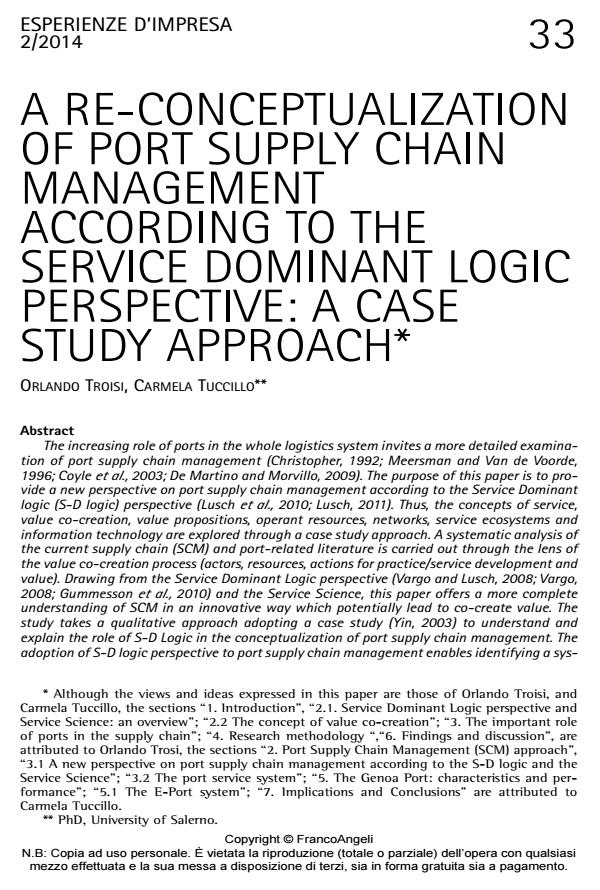A re-conceptualization of port supply chain management according to the service dominant logic perspective: a case study approach
Titolo Rivista ESPERIENZE D'IMPRESA
Autori/Curatori Orlando Troisi, Carmela Tuccillo
Anno di pubblicazione 2015 Fascicolo 2014/2
Lingua Italiano Numero pagine 18 P. 33-50 Dimensione file 160 KB
DOI 10.3280/EI2014-002003
Il DOI è il codice a barre della proprietà intellettuale: per saperne di più
clicca qui
Qui sotto puoi vedere in anteprima la prima pagina di questo articolo.
Se questo articolo ti interessa, lo puoi acquistare (e scaricare in formato pdf) seguendo le facili indicazioni per acquistare il download credit. Acquista Download Credits per scaricare questo Articolo in formato PDF

FrancoAngeli è membro della Publishers International Linking Association, Inc (PILA), associazione indipendente e non profit per facilitare (attraverso i servizi tecnologici implementati da CrossRef.org) l’accesso degli studiosi ai contenuti digitali nelle pubblicazioni professionali e scientifiche.
The increasing role of ports in the whole logistics system invites a more detailed examination of port supply chain management (Christopher, 1992; Meersman and Van de Voorde, 1996; Coyle et al., 2003; De Martino and Morvillo, 2009). The purpose of this paper is to provide a new perspective on port supply chain management according to the Service Dominant logic (S-D logic) perspective (Lusch et al., 2010; Lusch, 2011). Thus, the concepts of service, value co-creation, value propositions, operant resources, networks, service ecosystems and information technology are explored through a case study approach. A systematic analysis of the current supply chain (SCM) and port-related literature is carried out through the lens of the value co-creation process (actors, resources, actions for practice/service development and value). Drawing from the Service Dominant Logic perspective (Vargo and Lusch, 2008; Vargo, 2008; Gummesson et al., 2010) and the Service Science, this paper offers a more complete understanding of SCM in an innovative way which potentially lead to co-create value. The study takes a qualitative approach adopting a case study (Yin, 2003) to understand and explain the role of S-D Logic in the conceptualization of port supply chain management. The adoption of S-D logic perspective to port supply chain management enables identifying a system of value co-creation and competitiveness development, individualized according to the key stakeholders involved and the purpose it is created for. As this paper demonstrates, the port supply chain is re-conceptualized as a network of service systems each representing distinct (mostly operant) resource according to the service-dominant logic perspective (Lusch and Vargo, 2006). Hence, the main practical implication of this paper is the definition of a value co-creation process as a suitable perspective to develop ports’ competitiveness. The use of the model of S-D logic enables to design a comprehensive framework which allows planning the creation of competitive supply chains. The study represents a first attempt to analyse relations between port supply chain management according to the S-D logic perspective. This enables a more rigorous and comprehensive approach to understand ports’ competitiveness development.
Parole chiave:S-D logic, service science, port supply chain management, ports’ competitiveness.
- 2018 4th International Conference on Logistics Operations Management (GOL) Kaoutar Douaioui, Mouhsene Fri, Charif Mabrouki, El Alami Semma, pp.1 (DOI:10.1109/GOL.2018.8378099)
- Leveraging the supply chain costs and lead time impact of an innovative blockchain technology supply chain management application: the TrustyChain case study Gerardo Bosco, Francesco Mercuri, Ilda Maria Coniglio, Mario Calabrese, in European Journal of Innovation Management /2025
DOI: 10.1108/EJIM-06-2024-0627
Orlando Troisi, Carmela Tuccillo, A re-conceptualization of port supply chain management according to the service dominant logic perspective: a case study approach in "ESPERIENZE D'IMPRESA" 2/2014, pp 33-50, DOI: 10.3280/EI2014-002003